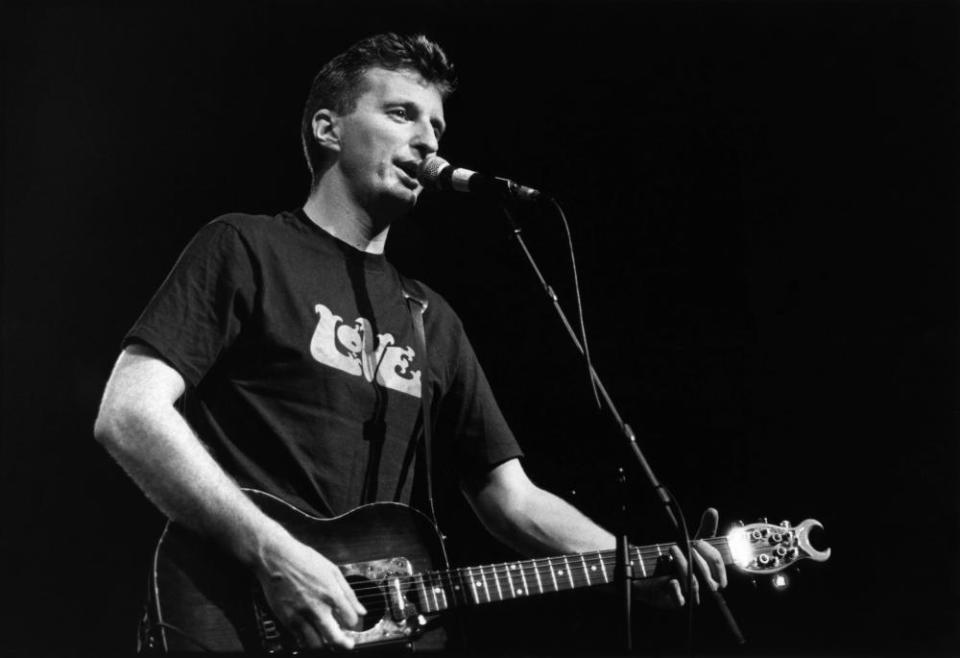How we made: Billy Bragg’s A New England

‘We heard John Peel on the radio asking for a mushroom biryani, so dropped one off at the BBC. Later that night, he played my record and I was away’
Billy Bragg, singer-songwriter
I wrote the song in 1979 when I was 21, living in Northamptonshire and playing in the punk band Riff Raff. I was coming back from the pub one night and saw two satellites in the sky. I thought they were a great metaphor for a relationship, so when I got home I wrote down: “I saw two shooting stars last night / I wished on them but they were only satellites.” When I came back to the song the following year to finish it, I realised I could truthfully open it with the line, “I was 21 years when I wrote this song / I’m 22 now but I won’t be for long”, just like Simon and Garfunkel’s Leaves That Are Green.
By 1980, Margaret Thatcher had been elected, the band had broken up and punk had dissipated into synthesiser groups, so A New England was my way of saying that I needed a hug as well as a new ideology. The line “the girls I loved in school are already pushing prams” was about my cohort. We’d all left school at 16 and were looking for different ways to become adults.
As a singer-songwriter, I played electric guitar because if I had played an acoustic, the rock clubs would have sent me to the folk clubs. If audiences heckled, I could just turn it up. A New England is like a Ramones song: all bar chords on the bottom two strings. The quiet bit before the solo, where I dampen the strings with the bottom of my hand for a chugging sound, was a technique I borrowed from Thin Lizzy.
Jeff Chegwin - TV presenter Keith’s twin – read a review of my tape in Melody Maker and gave me some studio time. He worked at music publisher Chappell and was the first person to show faith in me. When the resulting album, Life’s a Riot With Spy vs Spy, came out, I left a copy at the BBC.
That evening, Jeff and I were playing football in Hyde Park and afterwards we stood around a car listening to the radio. John Peel came on Radio 1 during Kid Jensen’s slot and asked if someone could bring him a mushroom biryani before his show later. Fifteen minutes later, me and Jeff were at Broadcasting House, still in our football gear, with a mushroom biryani. I told John that I’d left a record. Later that night, I tuned in and heard him say: “I’d have done this without the mushroom biryani.” Then he played The Milkman of Human Kindness and I was away.
A couple of years later, when Kirsty MacColl said she wanted to record A New England, she said she would need the genders changing and an extra verse. She invited me round for a fried breakfast and by the time she’d cooked it, I’d written the extra verse. Her shimmering pop version took it into the Top 10. I think it’s better than mine.
Oliver Hitch, producer
I was the in-house engineer at Chappell, where I would record songwriters trying to sell their songs to publishers. Billy was initially booked in for a day to see how he got on. I didn’t really get what he was about and waved goodbye in the corridor thinking: “What a nice bloke. Shame he’ll never make it.”
Then Jeff took me to see him playing in a pub, and that made all the difference. Billy could stand on stage, make people laugh, tell a story and turn it into the introduction of the song. In those days, everything was becoming more about high production values, so to see a guy doing it raw and live with just an electric guitar was very different. I had an idea how I could record him.
We recorded Life’s a Riot in three days. We spent the first day getting a good sound using various delays and the studio’s very old-fashioned plate reverb on the vocals. Once we’d got that, he could run through the repertoire, do take after take and we’d pick the best at the end.
Billy was rough round the edges but to me, A New England, Richard and The Milkman of Human Kindness were really standout songs. A New England took a handful of takes, and not long after, Life’s a Riot started selling in enormous quantities. I wasn’t due any royalties from the record but Billy, bless him, turned up at Chappell’s offices with a cheque saying: “I thought you deserved something.”
• A new vinyl edition of Billy Bragg’s recent album The Million Things That Never Happened is released on 4 February. Riff Raff play a one-off reunion gig at Dingwalls, London, on 8 February, for guitarist Wiggy’s 60th birthday.

